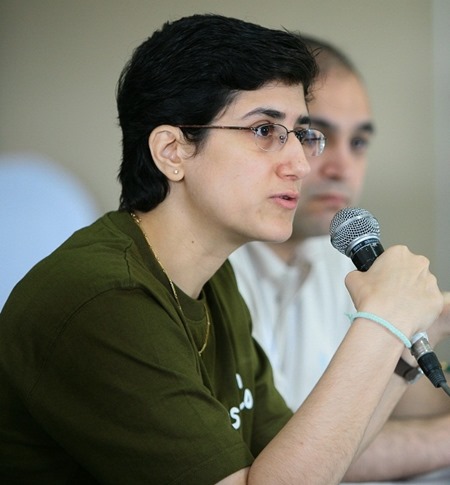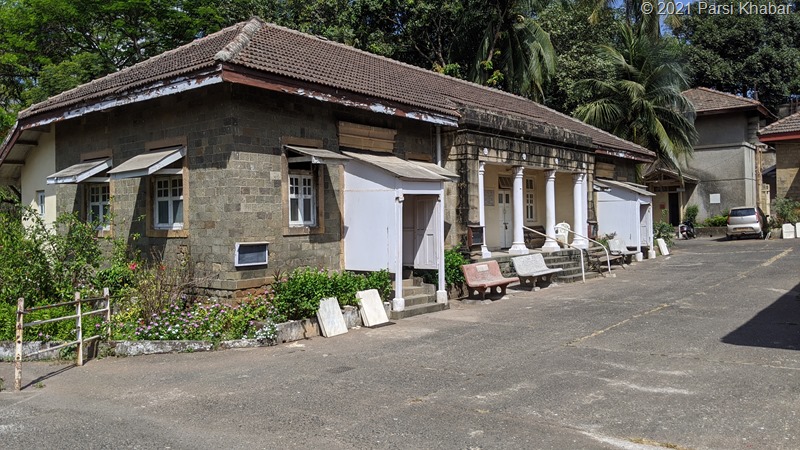Below is a report circulated by The Parsee Voice
The repairs to the Bisni Dakhma at our hallowed Mumbai Doongerwadi, are finally completed thanks to donations received from certain members of the Parsee community and the unrelenting efforts of the BPP trustees and staff.
Under the guidance of Dasturji Dr. F. M. Kotwal, the required ceremonies to restore the spiritual strength of the Dakhmas was undertaken by Ervad Aspandiar Dadachanji and his son Ervad Hormuz, which concluded with the performance of a Jashan ceremony today at Icchapurwalla Pavilion at Doongerwadi by Ervad Aspandiar Dadachanji. All those who had donated to the cause were graciously invited to the ceremony. All the BPP trustees were present and so were some of the donors.
After the Jashan, Chairperson Armaity Tirandaz thanked all involved in the efforts with a special memento being offered to Mr. Vistaspar Mehta, the very obliging and most helpful manager at Doongerwadi, under whose charge the repairs were undertaken.
Image for Representational purpose only. © 2021 Parsi Khabar
Those present were then introduced to Dr. (Ms.) Rashneh N. Pardiwala, Founder & Director, Centre for Environmental Research and Education (CERE), who has been undertaking native tree plantation drives at Doongerwadi and Ambawadi since the year 2015 in order to revive and restore the health of the forest at Doongerwadi with the support of the BPP. Dr. Pardiwala spoke briefly about the work accomplished by her over the past 5 years. Only Indian native plant tree species were selected for plantations. To-date, 7,092 trees have been painstakingly planted at Doongerwadi and Ambawadi and their survival rate was 98.2%. This plantation of 7092 trees also served as an important carbon sink for the city. A total of 7092 native trees had the potential to sequester 1,567 MTCO2 over a short span of only 15 years and will sequester many more tons of carbon pollution through their lifespan of growth.
In 2015, Dr. Pardiwala started planting native trees in Ambawadi on her own personal initiative, time, effort and resources. A total of 1477 trees were planted in the first year and slowly her passion to continue afforesting Doongerwadi grew and she continues working silently to help green one of last green lungs of South Mumbai. Her genuine voluntary efforts over the past 5 years has gradually gained the support of BPP Trustees, sponsors such as Mrs. Persis Vatcha of the Bai Maneckbai P. B. Jeejeebhoy Trust Funds and even community members namely Mr. Vispy Dalal and Mr. Firdosh Anklesaria.
Dr. Pardiwala regretted that many a times misinformed community members had summoned the police and municipal authorities under the mistaken impression that she was cutting down trees. She explained that only those termite infested trees which had earlier collapsed, were being removed as they would harm the other flora and fauna. She hopes that her efforts to rejuvenate one of the most historical and religious places situated in Mumbai is wholeheartedly supported by the community since Doongerwadi serves both the community and the city by providing vital ecological services that helps improve the city’s environment. She was very grateful for the unstinted support received by her from the BPP trustees in her activities at Doongerwadi.
This was followed by a plantation drive, where the guests were invited to plant sandalwood saplings. Sumptuous and delicious snacks and tea were served thereafter to all the invitees. The whole event in the pleasant environs of Doongerwadi graced by a gentle cool wind and the chanting of our Mathravani by the priests, was a soothing experience by itself.
*We are all quick to criticise our trustees for anything and everything. So, in all fairness, when they do a splendid job as done in this repair and restoration of the Bisni Dakhma, they deserve kudos and it is the community’s duty to thank them and encourage them. We should also wholeheartedly support their next endeavour, which is the repairs to the Anjuman Dakhma.*
Incidentally, she has been doing this whole activity at Doongerwadi completely free of charge and all funds received by her go directly into the plantation efforts of procuring large saplings, installing drip irrigation system with pump, hiring labour to cut and transport fallen trees etc. Not a penny is taken by her. On the contrary, she spends a lot from her own pockets to make ends meet and bridge any shortfall!
She also works entirely pro bono for her own NGO and does not draw a salary from CERE being the Founder Trustee. A true Zoroastrian to the core. A splendid example for today’s Parsee youth to emulate!]
Team TPV
Plantations at Doongerwadi & Ambawadi
Dr. Rashneh N. Pardiwala has been undertaking native tree plantation drives at Doongerwadi & Ambawadi since the year 2015 in order to revive and restore the health of the forest at Doongerwadi with the support of BPP.

Only Indian native plant tree species are selected for plantations with 3-4 year old saplings with a minimum height of 4-6 feet. Healthy well-rooted saplings with lateral branching are chosen to ensure to ensure a survival rate of 98.20%. To-date, 7,092 trees have been painstakingly planted at Doongerwadi and Ambawadi.
More than 50 species of flowering and fruiting forest species like Jarul, Bahava, Sawar, Saptparni, Jamun, Sandalwood, Ber, Bael, Phanas, Beheda, Bibba, Palas, Raktchandan, Chandan, Saag, Shisam etc have been planted to ensure a mixed healthy plantation.
This plantation of 7092 trees also serve as an important carbon sink for the city and every effort is taken to ensure 100% survival with day-to-day maintenance and care. A total of 7092 native trees have the potential to sequester 1,567 MTCO2 over a short span of only 15 years and will sequester many more tons of carbon pollution through their lifespan of growth.
In 2015, Dr. Pardiwala started planting native trees in Ambawadi on her own personal initiative, time, effort and resources. A total of 1477 trees were planted in the first year and slowly her passion to continue afforesting Doongerwadi grew and she continues working silently to help green one of last green lungs of South Mumbai. Her genuine voluntary efforts over the past 5 years has gradually gained the support of BPP Trustees, sponsors such as Mrs. Persis Vatcha of the Bai Maneckbai P. B. Jeejeebhoy Trust Funds and even community members namely Mr. Vispy Dalal and Mr. Firdosh Anklesaria who have extended support to this noble initiative. Individuals like Mr. Vispy Dalal and others are now gradually coming forth to start helping Dr. Pardiwala manage different aspects of the project and lend a helping hand.
Rashneh is an ecologist from the University of Edinburgh having specialized during her MSc and PhD in the field of Climate Change. She is the Founder & Director of the Centre for Environmental Research and Education (CERE), a Mumbai-based not-for-profit organization that works to promote environmental sustainability through formal education, government collaborations, corporate partnerships and public awareness campaigns. CERE undertakes CSR projects for a range of leading companies such as Wipro, HDFC Ltd, IndusInd Bank, Tata Capital, Toyota Motors, SP Group, BNP Paribas and many others. Dr. Pardiwala presently serves as a Director on the Board of Studies, St. Xavier’s College, Mumbai and is a Subject Expert for numerous educational foundations and charitable trusts. In 2005, Dr. Pardiwala was recognized as one of the youngest ‘Social Entrepreneur for Change’ and was awarded the Ashoka Fellowship. In 2009 Dr. Pardiwala was selected as one of Asia’s 21 Young Leaders by Asia Society. In 2011, Rashneh was selected by the Svenska Institute in Stockholm for Fellowship program on Corporate Responsibility and Sustainability. In 2013, Dr. Pardiwala was awarded the Ford Fellowship to study at Columbia University, NY.
It important that the Parsee community unites to actively conserve and manage the forests of Doongerwadi in a professional manner like our forests in national parks and sanctuaries.
Every year, many trees fall due to gusty winds and heavy downpours during the monsoon season. In the monsoon of 2020, more than 80 large old trees collapsed due to the Cyclone Nisarga and torrential rains which even led to a major landslide on the road flanking Doongerwadi from Hanging Gardens to Kemps Corner. This unforeseen natural calamity with falling trees destroyed property, damaged parked cars, broke water pipelines and flattened young plantations, leaving BPP and Dr. Pardiwala no option but to take necessary action. Trees are living beings, have a natural lifespan and require proactive maintenance. The overgrowth of weeds and climbers can restrict the growth of young saplings. Termite infested fallen trees need to be cut and removed to make space for re-planting younger saplings and restore ecological balance. Forestry techniques like thinning, lateral branch pruning, opening up of a closed canopy, removal of invasive and exotic species, organic mulching etc. need to be practiced, as and when required, so as to improve the health of our Doongerwadi forest which is under tremendous stress in a highly polluted urban city like Mumbai.
A healthy and diverse ecosystem is slowly emerging because of regular tree plantation drives during monsoon and year round maintenance that is resulting in increased floral and faunal biodiversity. The community needs to support the efforts of BPP and Dr. Pardiwala to help revitalize the forests of Doongerwadi. The thousands of young saplings planted today will grow into tall and strong trees of tomorrow to serve the coming generations of Parsee’s. Dr. Pardiwala hopes that her efforts to rejuvenate one of the most historical and religious places situated in Mumbai is wholeheartedly supported by the community since Doongerwadi serves both the community and the city by providing vital ecological services that helps improve the city’s environment.

